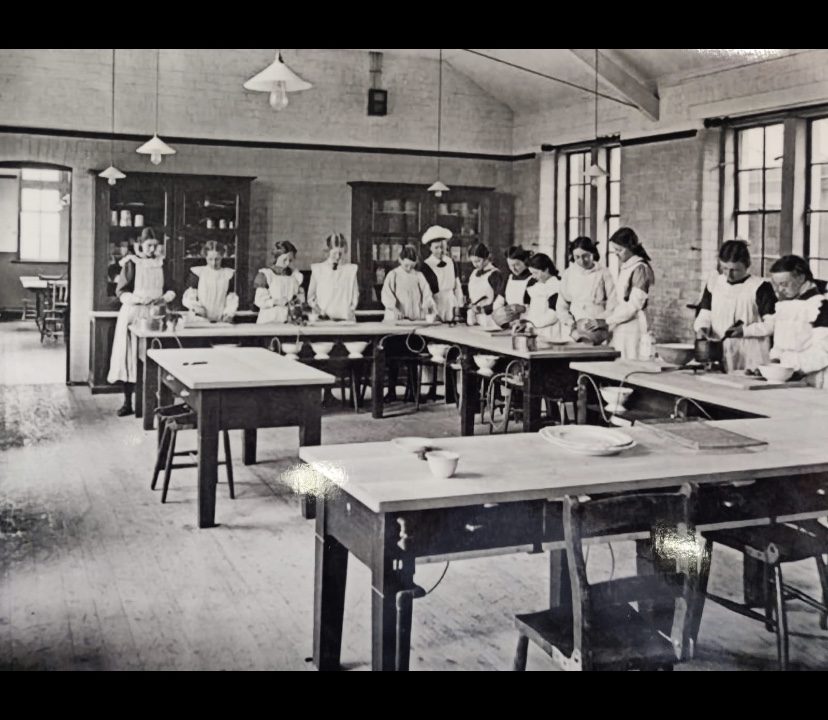The Pennines have for long supported a cottage industry of wool spinners and weavers. The outbuildings at Gomersal’s Pollard Hall were already equipped for processing cloth when rented by William Burnley in 1752. William was a “clothier”, a merchant who bought cottagers’ hand-woven cloth for “finishing” at Pollard Hall to create various styles of fabric.
In 1843 William’s grandson, Thomas, bought both Pollard Hall and the nearby Cloth Hall Mill: having finally evicted a sitting tenant, Thomas moved his equipment from Pollard Hall into the renamed “Gomersal Mills”.
Fire consumed the greatly enlarged mill in 1913. The mill was rebuilt but not the company’s finances: in 1916 the business was sold to “Willie” Gaunt, an extrovert entrepreneur with a permanent suite at the Savoy, once engaged to Fred Astaire’s sister, Adelle, owner of many London theatres and many woollen mills in Yorkshire.
In 1919 W. C. Gaunt Ltd. purchased the Government’s entire stock of textiles – uniforms, bedding, etc. – left over from WW1: an investment which couldn’t survive the ravages of the 1930 depression leaving Ramsey MacDonald Government to declare that “…the consequences of his [Mr. Gaunt’s] bankruptcy would harm the national economy”: the Treasury and a consortium of banks were instructed to take-over Gaunt’s empire – which they ran at a profit for the taxpayer for over 30-years– thus a Gomersal company became a temporary member of a nationalised industry!
Gomersal Mill was eventually demolished in 2004 to make way for housing.
In 1819, George Anderton, a young apprentice ironmonger from Bradford came to Cleckheaton to view two weaving looms. He bought the machines in situ and George started trading as worsted weaver at Upper Lane Mills.
Struggling to cope with the inconsistency of the available worsted yarns, George quickly realised that it would be more profitable to produce high-quality yarns for others to weave into cloth. In 1825 George Anderton patented a combing machine which within 10-years had generated the funds to build Moor End Mill (soon renamed as Victoria Mill).
In August 1842 Victoria Mill was attacked by the “Plug Rioters”. Unusually, it was Andertons’ workforce that repelled the intruders but two days later, young James Anderton galloped to Bradford to summon military assistance to repel a similar attack on nearby St. Peg Mill.
By 1847 the Anderton family had invested over £ 7,000 (today £ 750,000) in the Lancashire & Yorkshire Railway Company to persuade it to the route the Manchester to Bradford line via the Spen Valley.
In 1851 Andertons employed 387: by 1896 the payroll exceeded 700 and in 1912 George Anderton & Son Ltd. built a second large factory in Doncaster.
William Peabody Cooke emigrated from Kidderminster to Heckmondwike in 1795 to start making carpets: 30-years later he divided his business and gave half to his son Samuel who sited his venture in Liversedge: he bought a decrepit mill in Mill Bridge, erected a new building around the old structure and then disposed of the redundant masonry through the new windows!
In 1834 a Royal Commission investigating childrens’ employment in factories was informed that Cooke employed twenty-seven people in Millbridge included six children under the age of thirteen. The youngsters worked a 64-hour week, with 6-days of unpaid annual holiday for a maximum of 3-shilling per hour. The 21 adults on the payroll excluded “…. the weavers and winders who had nothing to do with the mill”. Zero-hour contracts are nothing new!
Samuel Cooke was recognised sees as good employer: he was also a workaholic. On retiring in 1877 to left the business to his sons he soon bored of leisure and purchased the local corn mill to run as a successful hobby!
In 1926 Blackwood Morton of Kilmarnock acquired a stake in Cooke’s business and finally bought a controlling interest in 1938. Under pressure from the new new-fangled process of “tufting”, BMK finally closed the Millbridge factory in 1979.

